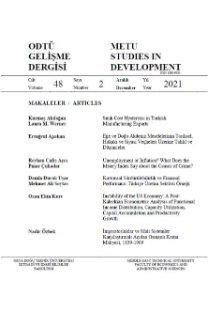East European Countries and Turkey vis-à- vis the EU: A comparative analysis of commercial relations
Bütün Doğu Avrupa Ülkeleri Avrupa Birliğinin ekonomisine, kurumlarına ve politikalarına, özellikle de halen amaçladığı Avrupa kıtasının neoliberal yapılanmasına önemli ölçüde bağımlı olduğundan, 2008 krizi bölgeyi gerek ekonomik gerekse sosyal açıdan ciddi bir şekilde etkilemiştir. Bu makale, 2008 krizinden kaynaklanan olumsuz ekonomik ve sosyal ortamın, Türkiye dahil seçilmiş on bölge ülkesi arasında ticareti arttırmak suretiyle işbirliğini geliştirip geliştirmediğini analiz etmeyi amaçlamaktadır. Bu makale, Avrupa Birliğinin uzun zamandan beri devam eden neoliberal politikalarının bu on ülkenin finansal krizden etkilenme nedeni olsa dahi, bu yapısal nedenin geleneksel Avrupa pazarlarına alternatif olarak bölge içi ticareti arttırmak suretiyle işbirliğini geliştirmelerine imkan sağlamadığı sonucuna ulaşmıştır. Tam tersine, eşitsiz ve birleşik gelişme yaklaşıma uygun olarak Avrupa Birliği bu ülkelerin ticari faaliyetlerindeki başat rolünü korumaktadır.
AB Karşısında Doğu Avrupa Ülkeleri ve Türkiye: Ticari ilişkilerin karşılaştırmalı bir analizi
As all East European Countries are, in one way or another, linked to the economy, institutions, and policies of the European Union, especially with respect to its present aim of neoliberal structuring of the European continent, the 2008 financial crisis severely affected the region both economically and socially. This paper analyzes whether the negative economic and social environment in Europe, stemming from the 2008 crisis, has enhanced cooperation by promoting trade among the selected ten countries in Eastern Europe including Turkey. It concludes that although the long-standing neoliberal policies of the European Union were a basic cause adversely affecting Eastern Europe by the financial crisis, this structural cause did not lead to increased cooperation by promoting intra-regional trade as an alternative to their traditional European markets. On the contrary, the European Union still maintains its dominant role in the commercial activities of these countries due to the uneven and combined development.
___
- Published Reports, Documents and Statistics
- CIA-The World Fact Book, https://www.cia.gov/library/publications/the-world- factbook/rankorder/2003rank.html (accessed on 06/01/2014).
- Central Bank of Bosnia and Herzegovina, Non-Observed and Grey Economy in BH, 2008 http://www.cbbh.ba/files/specijalne_teme_istrazivanja/sti_01_08_en.pdf (accessed on22/11/2014).
- Central Bank of Hungary, http://english.mnb.hu/(accessed on 06/01/2014)
- European Commision official web page http://ec.europa.eu/enlargement/countries/detailed-country- information/bosnia-herzegovina/index_en.htm (accessed on 18/08/2014).
- Report of Turkish Embassy Office of Commercial Counselor in Sofia, 2011,
- http://www.musavirlikler.gov.tr/upload/BG/rapor%202011.docx (accessed on 06/06/2013)
- Report of Turkish Embassy Office of Commercial Counselor in Belgrade, 2013, http://www.musavirlikler.gov.tr/upload/SRB/muteahhitlik-rapor.doc (accessed on06/06/2013)
- The Albanian Centre for Competitiveness and International Trade (ACIT), Tirana 2012, http://www.usaid.gov/sites/default/files/documents/1863/USAID%20Study%20on%20Gre ek%20Crisis.pdf (accessed on 22/11/2014).
- Trade Map Statistics, The International Trade Centre (UNCTAD/WTO) http://www.trademap.org/Index.aspx (accessed on 05/02/2014).
- World Trade Organisation http://www.wto.org/english/news_e/pres13_e/pr694_e.htm (accessed on 06/01/2014).
- The World Bank Data http://data.worldbank.org/ (accessed on 30/01/2014).
- Books, Articles and Presentations
- ANASTASAKIS, O. and WATSON, M. (2011), Reform Challenges and Growth Prospects inSouth East Europe, in O. Anastasakis, J. Bastian and M. Watson (eds.), From Crisis to Recovery Sustainable Growth in South East Europe, South East European Studies at Oxford, 1-12.
- ASHMAN, S. (2009), Capitalism, uneven and combined development and the transhistoric, Cambridge Review of International Affairs, 22(1), 29-46.
- ASHMAN, S. (2012), Combined and Uneven Development, in B. Fine and A. Saad-Filho (eds.), The Elgar Companion to Marxist Economics, Cheltenham and Northampton: Edward Elgar, 60-5.
- BACHE, I., GEORGE, S. and BULMER, S. (2011), Enlargement, Politics in the European Union, New York: Oxford University Press, 529-49.
- BECKER, J. and WEISSENBACHER, R. (2012), Western Balkans: Peripheral integration without stability?, in M. Antevski and D. Mitrović (eds.), Western Balkans: From Stabilisation to Integration, Belgrade: Institute for International Politics and Economics, 31-52.
- FINE, B. (2009), Neoliberalism as Financialisation, in A. Saad-Filho and G. L.Yalman (eds.), Economic Transition to Neoliberalism in Middle-Income Countries: Policy Dilemmas, Economic Crises, Forms of Resistance, London: Routledge, 11-23.
- HARDY, J. (2010),Crisis and Recession in Central and Eastern Europe, International Socialism, 128, http://www.isj.org.uk/index.php4?s=contents&issue=128.
- BECKER, J. and JAGER, J. (2010), Development Trajectories in the Crisis in Europe, Debatte: Journal of Contemporary Central and Eastern Europe, 18(1), 5-27.
- BECKER, J. and JAGER, J. (2011), European Integration in Crisis: the Centre-Periphery Divide, The 17th Euromemo Workshop on Alternative Economic Policy, Vienna, 16-18 September.
- MANDLE, J. R. (1980), Marxist Analyses and Capitalist Development in the Third World, Theory and Society, 9(6), 865-76.
- MENCINGER, J. (2007), From Socialism to EU Membership, in J. Becker and R. Weissenbacher (eds.), Dollarization, Euroization and Financial Instability, Marburg: Metropols-Verlag, 19-34.
- ONARAN, Ö. (2007), International Financial Markets and Fragility in Eastern Europe: Can it Happen Here?, in J. Becker and R. Weissenbacher (eds.), Dollarization, Euroization and Financial Instability, Marburg: Metropols-Verlag, 129-48.
- SAAD-FILHO, A. and YALMAN, G.L. (2009), Introduction, in A. Saad-Filho and G. L.Yalman (eds.), Economic Transition to Neoliberalism in Middle-Income Countries: Policy Dilemmas, Economic Crises, Forms of Resistance, London: Routledge, 1-7.
- SANFEY, P. (2010), South-Eastern Europe: Lessons from the Global Economic Crisis, European Bank for Reconstruction and Development, Working Paper No. 113, February.
- SCHIMMELFENNIG, F. (2001), The Community Trap: Liberal Norms, Rhetorical Action, and the Eastern Enlargement of the European Union, International Organization, 55(1) 47-80.
- SEDELMEIER, U. (2005), Eastern Enlargement: Towards a European EU?, in H. Wallace, W. Wallace and M. Pollack (eds.), Policy-Making in the European Union, Oxford: Oxford University Press, 401-27.
- RUPNIK, J. (2011), The Balkans as a European Question, in J. Rupnik (ed.), The Western Balkans and the EU: The Hour of Europe, European Union Institute for Security Studies, Chaillot Papers, Paris, 17-30.
- TÜRKEŞ, M. and GÖKGÖZ, G. (2006), The EUs Strategy Towards the Western Balkans: Exclusion or Integration?, East European Politics and Societies, 20(4), 659-90.
- VAN DER PIJL, K. (2006), Global Rivalries from Cold War to Iraq, London: Pluto Press.
- ISSN: 1010-9935
- Yayın Aralığı: 3
- Başlangıç: 2018
- Yayıncı: ODTÜ İİBF
